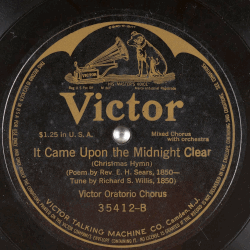Christmas Song #3 – It Came Upon The Midnight Clear
Yes, this year’s carol is the beautiful and rather unusual “It Came Upon The Midnight Clear” (aka It Came Upon A Midnight Clear – but of course, we are talking about the event of human history…).
It came upon the midnight clear,
Edmund Hamilton Sears
That glorious song of old,
From angels bending near the earth,
To touch their harps of gold;
“Peace on the earth, good will to men,
From Heaven’s all gracious king.”
The world in solemn stillness lay,
To hear the angels sing.
“Peace on Earth” is without a doubt the theme of this carol, and the author was a pastor – Reverend Edmund H. Sears. The theme comes, of course, from Luke chapter two, when the angels say (well, it doesn’t say that they sang, but it was certainly poetic) –
Glory to God in the highest,
and on earth peace among those with whom he is pleased!
The familiar Authorized Version (King James) would be “Glory to God in the highest, and on earth peace, good will toward men.” And so Sears paraphrases, emphasizing that the message comes from “Heaven’s all gracious king”.
And who is the all gracious king? Well, God of course. But here’s the first trick of history. Sears studied and served in ministry under the Unitarian religion.
Unitarians are known for denying the Trinity – the teaching that God is one being, but Three Persons. Generally speaking, for Unitarians, Jesus was not the pre-existing Son of God.
There seems to have been, as there in now, a range of beliefs in Unitarianism regarding Jesus. From my brief reading of Sear’s work Regeneration, it seems that he took more of a modalistic approach, believing that, in some sense, Jesus was fully God, but not a distinct eternal Person from God the Father or the Holy Spirit.
So my apologies if I’ve already ruined the song for you. However, as we will see, these beliefs don’t really come into the song at all (more on that later). And Sears did, as I mentioned, believe in the full deity of Christ, born in Bethlehem.
Sears had been involved in ministry and had pastored a large church. But becoming burned out, he returned to the small church he had served in earlier to serve part time. As we talked about in the last post, it was a turbulent time. The Mexican-American War had ended, and the Civil War was coming. War seemed commonplace in the world as a whole. Added to the conflicts in his own heart, the message of peace was very important to Sears. He’s right – the cry of peace on earth is glorious!
Still through the cloven skies they come
Edmund Hamilton Sears
With peaceful wings unfurled,
And still their heavenly music floats
O’er all the weary world;
Above its sad and lowly plains,
They bend on hovering wing,
And ever over its Babel sounds
The blessèd angels sing.
Through God’s Word and the preachers that share it, the message is still shared – especially at Christmas. Is anyone listening? So many noisy “Babel sounds” seem intent on drowning out the message of the angels.
The giving of the Son itself was a message of peace – God reaching out to the human world. The fact that God entered His own creation is a truth and a moment without equal. Although many believe that we are all somehow a part of God, the Bible teaches that God is not His creation – He is totally other, apart, completely holy. Not controlled by anything that we can do or think. Not accessible unless He chooses to reveal Himself.
It’s a terrifying thought, in some ways. As the disciples said in fear, seeing only a small part of His power, “Who then is this, that even the wind and the sea obey him?” (Mark 4:41) He can control all things, but nothing can control Him.
And yet – what a moment – He came as a tiny baby. And through Him, God would bring peace.
And that seems to be what Sears longed for. In a world filled with the seemingly never-ending noise of war, there still rang out God’s call to peace.
Oh, but we’re only getting started. There’s more to think about in this carol – and some unusual facts that we’ll talk about later.
Meanwhile, click the image above to listen to an early recording, made in 1914 (65 years after the carol was first published). This is one of the two common tunes used for It Came Upon The Midnight Clear.

